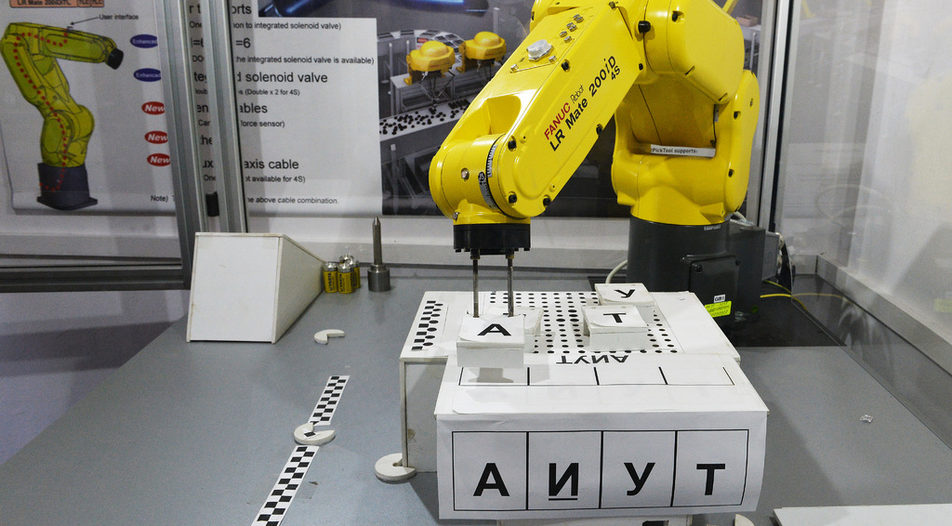Looking at the big picture, last year was not great for goods selling abroad under the label "Made in Bulgaria" - export growth slowed to 1.2% from 15.7% the year before, according to official statistics.
However, a closer look at the numbers offers a different perspective. Last year, Bulgaria's exports of goods totalled 55.2 billion levs, equivalent to over 50% of the country's gross domestic product. The overall increase in exports was slim as sales to countries outside the EU were down by 12.5% from a high base in 2017 and exports of arms and fuels decreased. Another factor was the crisis in Bulgaria's largest trade partner outside the EU - Turkey.
On the other hand, two-thirds of Bulgarian exports of goods go to the EU, where the numbers are more positive. Sales to the EU rose by 9.1% in 2018, in large part driven by machines, appliances and components for them. In short - Bulgaria has started to manufacture more goods of higher value, which is the type of production that makes the country more competitive abroad, increases the potential of its economy, and raises income levels domestically.
On the downside, storm clouds appear to be gathering over the European economy. For example, a number of international institutions have already lowered their forecasts for GDP growth in the Eurozone following the anaemic increase in Germany, recession in Italy, protests in France, and the never-ending tale of Brexit. Problems in the euro area usually spell trouble for Bulgarian producers as well.
Five-year roundup
"As a whole, the growing share of investment goods that need more complex processing in Bulgarian exports of goods has been extremely positive over the past 2-3 decades," says Desislava Nikolova, chief economist at Sofia-based think-tank Institute for Market Economics (IME). "This shift not only shows the serious investments in Bulgarian industry but also reflects the country's growing export competitiveness," says Nikolova.
Sales of investment goods abroad, which include machines, spare parts and equipment, have grown at the fastest pace out of all groups since 2013 - by 79% to 14 billion levs in 2018. By comparison, total exports have risen by 26.8%. In addition, the investment goods' share in total exports has increased by 7.4 percentage points to 25.2% over the last five years at the expense of natural resources and raw materials, according to data from the Bulgarian National Bank (BNB).
More machines, less fuel and arms
Unlike sales to non-EU countries, Bulgarian exports to the EU rose at a decent rate last year. Over a third of the annualized increase of 9.1% was due to machinery. Large contributions came from sales of rectifiers (317 million levs), boards and consoles for electrical circuit management (418 million levs), and chips (221 million levs).
The big markets
The biggest markets for Bulgarian exports last year were Germany, Italy and Romania. Overall, sales to these three countries made up close to half of total Bulgarian exports in 2018.
Exports to Germany grew significantly - by 16.2%, largely due to sales of machines (3.2 billion levs). For example, exports of electricity transformers and converters grew by 85% to a total of 160 million levs, whereas sales of chips topped 68 million levs, double the value recorded in 2017. On the other hand, companies from the shoe, textile and clothing industries in Bulgaria sold goods worth over 1.2 billion levs in Italy, and are dependent on the Italian market. However, the big questions here are how long the recession in Italy will hold and how will that affect Bulgarian businesses. On a positive note, Bulgarian textile exports do not depend solely on Italy, as they go to Italian brands, which then sell in recession-free countries.
Outside the EU, Bulgaria's biggest trade partner is Turkey, with metals and fuels having the largest share of exports. However, statistics show a significant decrease in exports in 2018, which is due to one-off factors such as the Turkish lira crash, according to the BNB.
Move over, China!
The Bulgarian national statistics also show an interesting breakthrough - Bulgarian e-bikes selling in Europe. The products launched in the EU in 2016, recording sales of 59.4 million levs. Two years later, exports of Bulgarian e-bikes soared to 207.7 million levs.
The sharp rise in interest in Bulgarian bikes can be attributed to two factors. On the one hand, Europe is becoming increasingly interested in this mode of transport. On the other hand, in 2018 the European Commission implemented temporary anti-dumping duties on Chinese e-bike imports following a complaint in 2017 from the European Bicycle Manufacturers Association. As of this year, the duties are permanent. As a result, Europeans turn to other cheap alternatives such as Bulgarian products.
Equipment imports
The growth in wages in the last few years has affected imports as well. Imports rose by 6.2% to 63 billion levs in 2018. The drivers of growth were sales of phones, cars and appliances for control of electrical circuits. Traditionally, fuels had the biggest share in Bulgaria's imports, where there was almost no change compared to the previous year.
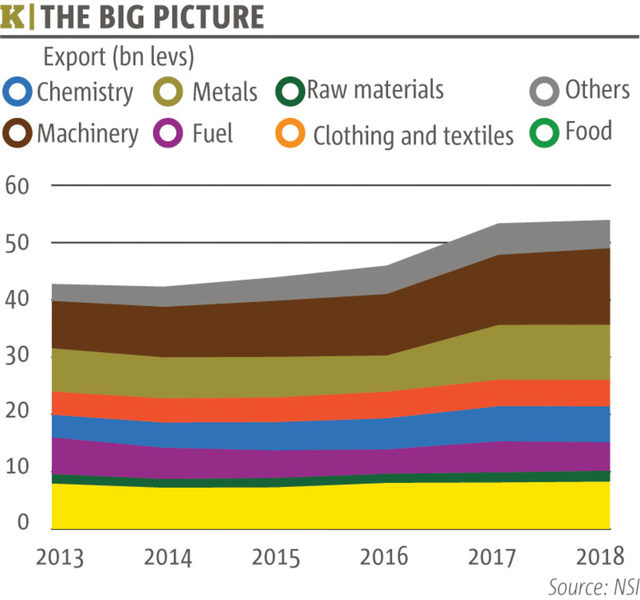
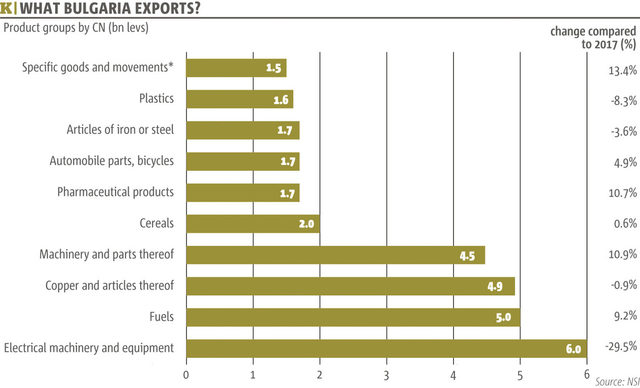
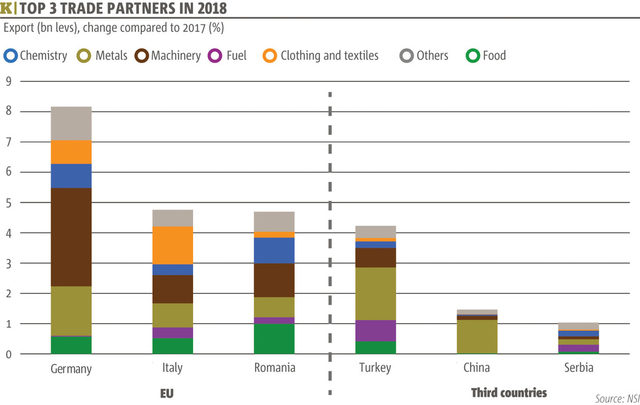
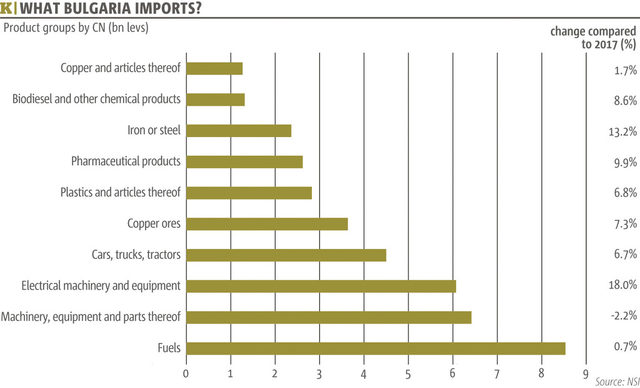
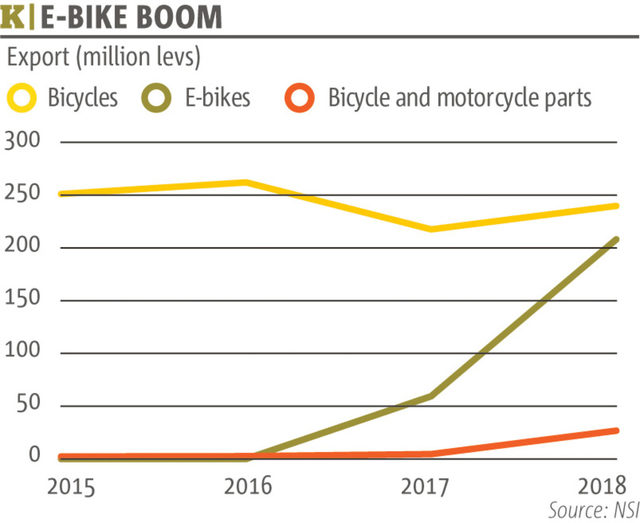
Looking at the big picture, last year was not great for goods selling abroad under the label "Made in Bulgaria" - export growth slowed to 1.2% from 15.7% the year before, according to official statistics.
However, a closer look at the numbers offers a different perspective. Last year, Bulgaria's exports of goods totalled 55.2 billion levs, equivalent to over 50% of the country's gross domestic product. The overall increase in exports was slim as sales to countries outside the EU were down by 12.5% from a high base in 2017 and exports of arms and fuels decreased. Another factor was the crisis in Bulgaria's largest trade partner outside the EU - Turkey.








